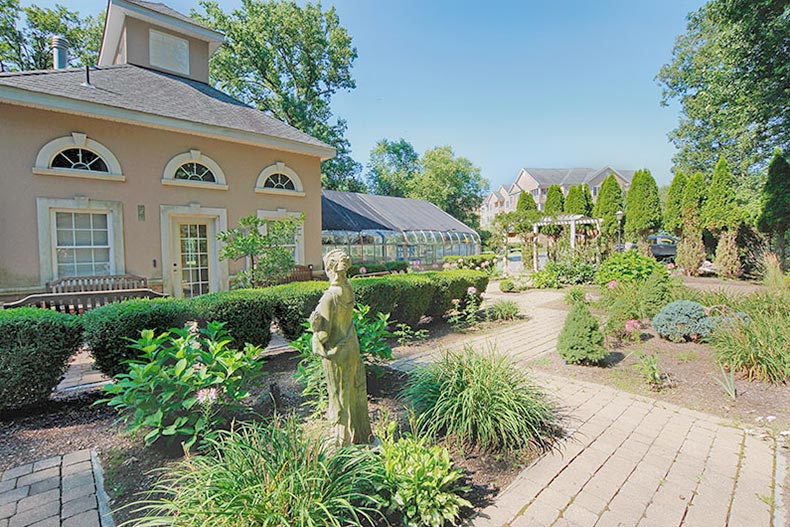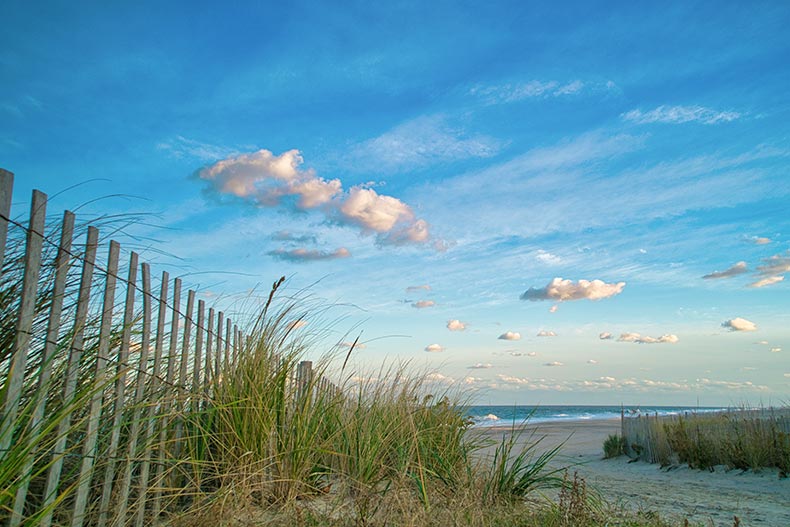Although it’s the fifth-smallest state in the nation, New Jersey is the most densely populated with approximately 1,196 persons per square mile. There are also many active adult communities; at last count, we feature almost 300 on 55places.com.
So why do so many retirees choose to live in the Garden State? Like anywhere else, it has pros and cons that must be carefully weighed. If you’re thinking of retiring here, read on to see whether or not the scales tip in your favor.
Retiring in New Jersey Pros and Cons
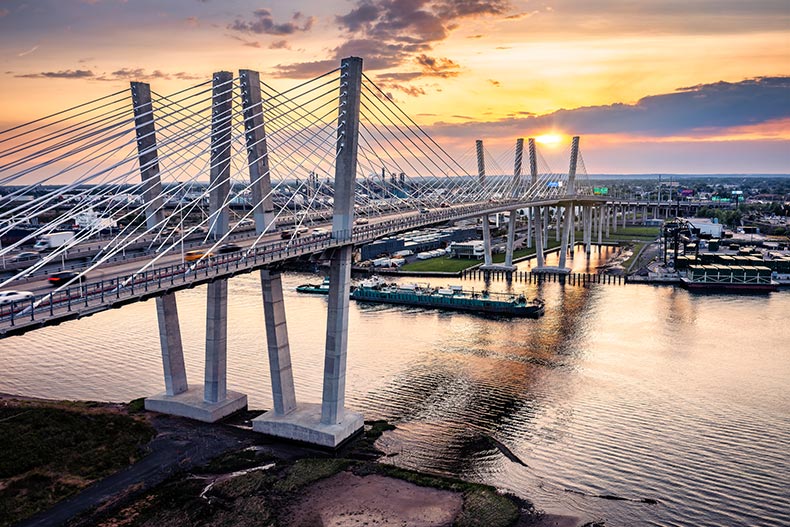
Pros
Easily Accessible
Two of the biggest benefits of living in New Jersey are the location and public transportation. You can get to New York City, Philadelphia, Wilmington, and Baltimore in under three hours from most parts of the state, and all of these cities have airports, trains, and other ways to travel to and from NJ.
Picturesque Beaches and Natural Spaces
The Jersey beaches line most of its east coast. There are also beautiful parks, forests, and open spaces to enjoy like Brendan T. Byrne Forest, Tyler State Park, and Liberty State Park.
Vibrant Local Life
Other attractions include the Camden Aquarium as well as charming small towns like Morristown and Princeton. Jersey is also known for its behemoth shopping malls, busy highways sprinkled with strip malls, endless restaurants and diners, and its loyal sports fans who love Philly teams (South Jersey) and New York teams (North Jersey).
Cons
The High Cost of Living
One downside of living in New Jersey is that its cost of living can be higher when compared to nationwide averages. In general, the closer you get to Philly or New York the higher it is, and this is reflected in housing costs, food, clothing, and other purchases.
New Jersey Taxes
NJ taxes are another hurdle. According to SmartAsset, the average effective property tax rate in New Jersey is 2.26%, while the national average is 0.99% Currently, NJ has the highest property taxes in the nation.
Lots of Traffic
The traffic here is another con, especially for commuters. However, the state does have extensive bus and train systems that help active adults get to where they need to be.
New Jersey Climate
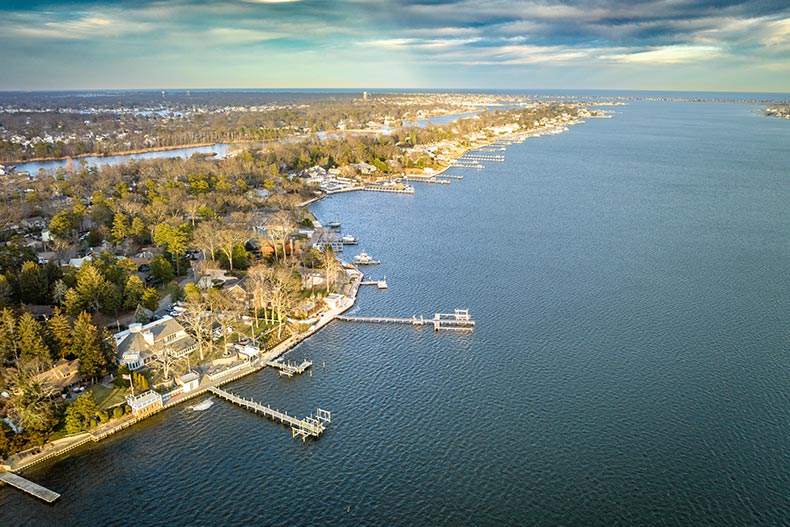
Retirees who like to experience all four seasons appreciate New Jersey weather. Winters can be cold with a few snowstorms and daytime temperatures hovering around 45 degrees. Spring usually starts off chilly and windy, and then blooms with warmer air and flowers everywhere.
Summertime can get pretty hot and humid with temperatures reaching the 80s and 90s, and the fall is colorful as the cooler weather approaches. As you head farther north, the temperatures are generally a bit cooler overall.
New Jersey Taxes
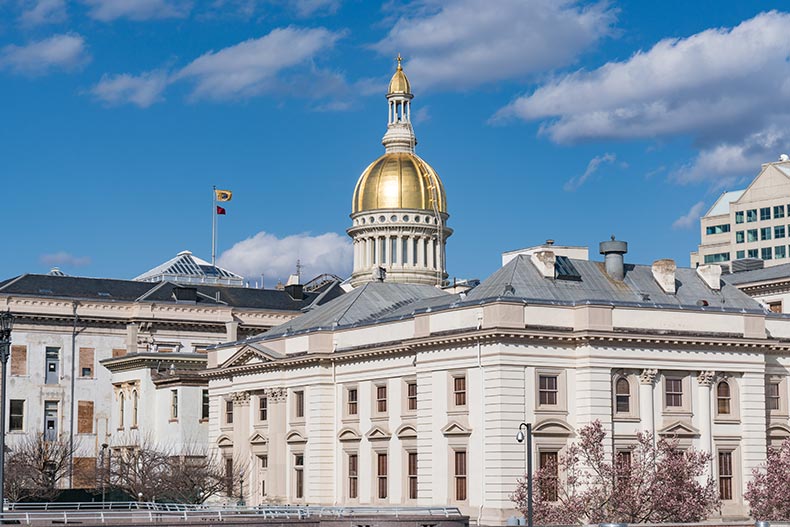
New Jersey taxes depend on the amount of income earned:
- $40,000 to $75,000: 5.525%
- $75,000 to $500,000: 6.37%
- $500,001 to $1,000,000: 8.97%
- $1,000,000 and up: 10.75%
The state sales tax rate is 6.625%, but New Jersey cities and municipalities don’t have a city sales tax. Many items are exempt from sales tax, including clothing, groceries, and prescription drugs. However, as of January 2024, New Jersey has the 8th highest gas tax in the U.S. at 42.35 cents per gallon.
New Jersey Property Taxes
Yes, property taxes are high, but New Jersey property tax rates vary widely by county. According to NJ.com, there are some towns where the average tax bills are two or three times the state average. Their data showed that the highest property taxes were paid in towns in Essex, Bergen, Monmouth, Morris, Ocean, and Mercer counties. On the other hand, the lowest property taxes were paid in towns in Sussex, Salem, Cumberland, Cape May, and Camden counties.
New Jersey Tax Exemptions for Seniors
Retirees who live in New Jersey get some tax breaks, including an annual property tax deduction of $250. Second, the Senior Freeze Program reimburses some seniors for property tax increases on their residences. The ANCHOR Program also offers property tax relief to New Jersey residents who meet certain income limits, and there are additional deductions and exemptions for qualifying veterans. These programs all depend on eligibility, and information can be found at the NJ Division of Taxation.
New Jersey Health Care
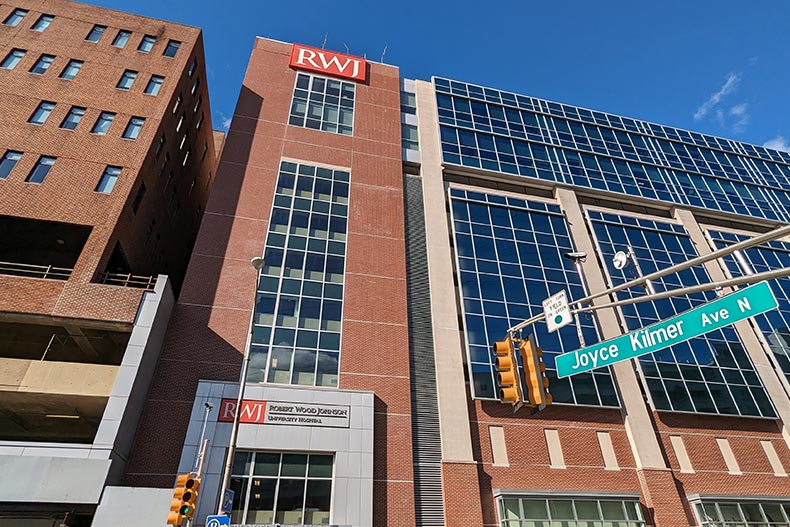
Jersey is known for its outstanding health care. U.S. News & World Report ranked the top providers, placing some of the top options in North and Central Jersey:
- Hackensack University Medical Center – Hackensack
- Morristown Medical Center – Morristown
- Overlook Medical Center – Summit
- Robert Wood Johnson University Hospital – New Brunswick
There are also plenty of excellent medical organizations further south, including MD Anderson Cancer Center in Camden County, Jefferson Health System in Camden and Gloucester County, Lourdes/Virtua Health System in Burlington County, and Hackensack Meridian Health in Monmouth and Ocean County.
Where to Live in New Jersey
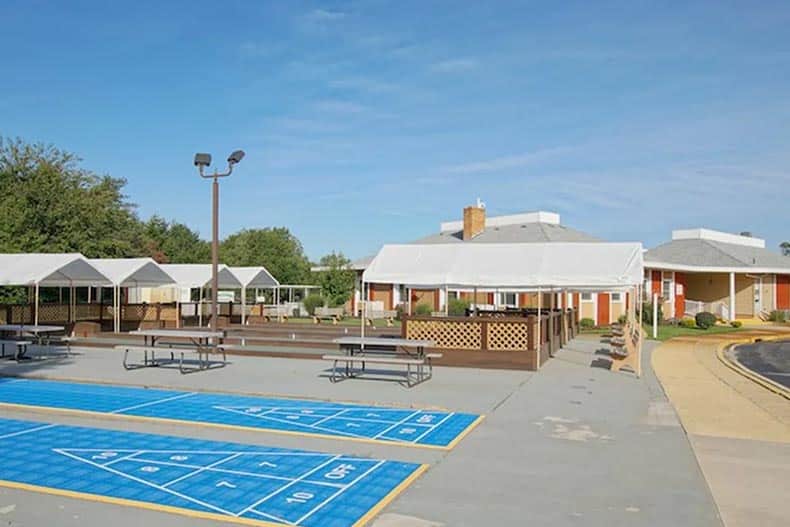
Northern New Jersey
The state’s largest metropolitan area is comprised of the northern counties of Bergen, Passaic, Sussex, Essex, Hudson, Warren, and Morris, which are part of the New York metro area. This area is densely populated since it’s closest to the Big Apple, and it has major highways like the NJ Turnpike and the Garden State Parkway to keep everyone moving (unless traffic is bad). These counties generally have a higher cost of living and a faster pace of life.
Some of the most-visited outdoor attractions include Morristown National Historical Park and Liberty State Park. The Newark Museum is a great place to take the grandkids, and the biggest shopping mall in the state, Westfield Garden State Plaza, is in Paramus.
There are many active adult neighborhoods in this part of the state. Some are very exclusive, including the Four Seasons at Great Notch Spa and Club in Woodland Park and Fox Hills in Rockaway. Bald Eagle Commons in West Milford is farther out from NYC with homes at lower price points.
Central New Jersey
Middlesex, Somerset, Hunterdon, Mercer, Union, and Monmouth County are all considered part of Central NJ, which is very popular with retirees. Those who live here benefit from being close to seashore towns like Spring Lake as well as major cities like New York City and Philly. As you head west towards Trenton, there are wonderful areas like Washington’s Crossing to explore.
The cost of living is less than North Jersey, and many of the more established communities have very affordable homes. Out of the six Central NJ counties, Hunterdon is the most spread out. Central Jersey has 55+ communities of all sizes, from 17 homes to over 2,000. Some of the most popular include Covered Bridge in Manalapan and Greenbriar in Monroe.
Southern New Jersey
The southern counties of Atlantic, Burlington, Camden, Cumberland, Gloucester, Ocean, and Salem are all part of the Philadelphia metro area. While Burlington, Camden, and Gloucester have a faster pace of life (and miles of busy roads full of intriguing shopping centers), Cumberland and Salem are much more rural. Atlantic and Ocean fall somewhere in between and sit beside the Atlantic coastline.
Popular beach towns like Cape May, Point Pleasant, and Atlantic City get busy in the summertime, but they also have year-round attractions, and many folks drive over to Philly for work and play. Top golf courses include Bey Lea and Town and Country Golf Links.
South Jersey can certainly compete with Central Jersey when it comes to the number of retirement communities. Holiday City at Berkeley in Toms River is the largest in NJ, with 10,636 homes. Other excellent (and smaller) choices include The Village Grande at Camelot in Glassboro and Greenbriar Oceanaire in Waretown.
55places Is Here to Help!
The real estate experts at 55places.com are here to help your dream retirement become a reality. Contact us today and we’ll connect you with one of our local real estate agents who can help you find the perfect home in a beautiful community in the Garden State. There’s no need to put off moving to New Jersey any longer. We’re here to help!

